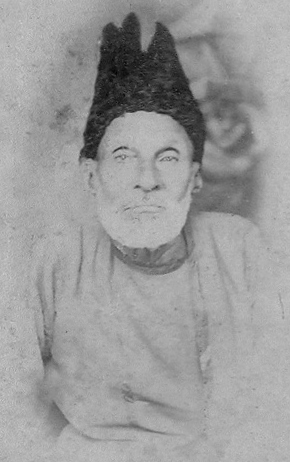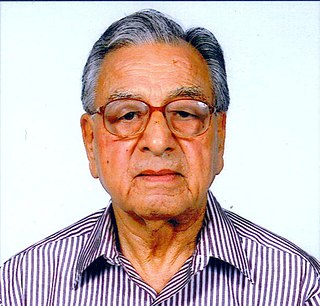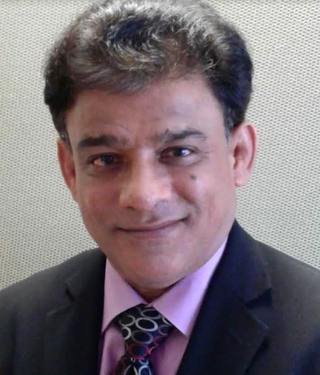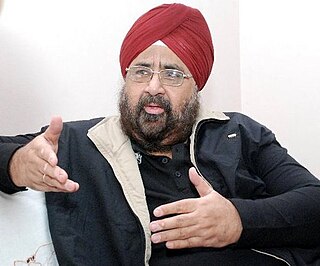Related Research Articles

Kaifi Azmi was an Indian Urdu poet. He is remembered as the one who brought Urdu literature to Indian motion pictures. Together with Pirzada Qasim, Jaun Elia and others he participated in many memorable Mushaira gatherings of the twentieth century. He was also a communist who wanted to see India one day become a socialist state. His wife was theatre and film actress Shaukat Kaifi.

Ahmad Nadeem Qasmi born Ahmad Shah Awan was an Urdu language Pakistani poet, journalist, literary critic, dramatist and short story author.
Wazir Agha was a Pakistani Urdu language writer, poet, critic and essayist. He has written many poetry and prose books. He was also the editor and publisher of the literary magazine "Auraq" for many decades. He introduced many theories in Urdu literature. His most famous work is on Urdu humor. His books focus on modern Urdu poets, notably those who have written more poems instead of ghazals. Agha's poems mostly have an element of the story.

Balraj Sahni was an Indian film and stage actor, who is best known for Dharti Ke Lal (1946), Do Bigha Zameen (1953), Chhoti Bahen (1959), Kabuliwala (1961), Waqt (1965) and Garm Hava (1973). He was the brother of Bhisham Sahni, noted Hindi writer, playwright, and actor.

Kartar Singh Duggal was an Indian writer who wrote in Punjabi, Urdu, Hindi, and English. His works include short stories, novels, dramas and plays. His works have been translated into Indian and foreign languages. He has served as director of the All India Radio.
Sher Muhammad Khan, , better known by his pen name Ibn-e-Insha,, was a Pakistani Urdu poet, humorist, travelogue writer and newspaper columnist.

Jan Nisar Akhtar was an Indian poet of Urdu ghazals and nazms, and a part of the Progressive Writers' Movement, who was also a lyricist for Bollywood.

Mirza Asadullah Beg Khan (1797–1869), also known as Mirza Ghalib, was an Indian poet. He was popularly known by the pen names Ghalib and Asad. His honorific was Dabir-ul-Mulk, Najm-ud-Daula. During his lifetime, the already declining Mughal Empire was eclipsed and displaced by the British East India Company rule and finally deposed following the defeat of the Indian Rebellion of 1857; these are described through his work.
Ghanta Ghar literally means Hour House in Hindi–Urdu, implying Clock House or Clock tower. There are several Ghanta Ghars in India, Nepal and Pakistan.

Amjad Islam Amjad, PP, Sitara-e-Imtiaz was a Pakistani Urdu poet, screenwriter, playwright and lyricist.

Wali Muhammad Wali (1667–1707), also known as Wali Dakhani, Wali Gujarati, and Wali Aurangabadi, was a classical Urdu poet from India.
Mir Tanha Yousufi was a Pakistani Punjabi and Urdu writer, best known for his Punjabi literature. He produced two short story collections and five novels in Punjabi. Most of his work was transliterated in Gurumukhi script in Indian Punjab. Besides his Punjabi works, he was a well known Urdu and Punjabi poet.

Mohinder Pratap Chand was an Urdu writer and poet of India who promoted Urdu language and literature in India.

Mehr Lal Soni, better known as Zia Fatehabadi, was an Indian Urdu ghazal and nazm writer. He was a disciple (shaagird) of Syed Aashiq Hussain Siddiqui Seemab Akbarabadi (1882–1951), who was a disciple of Nawab Mirza Khan Daagh Dehlvi (1831–1905). He used the takhallus of Zia meaning "Light" on the suggestion of his teacher, Ghulaam Qadir Farkh Amritsari.
Sukhdarshan Dhaliwal (1950–2015) was a Punjabi-American poet, who has published three collections of poetry in Punjabi and one collection of ghazals in English.

Raees Warsi is a Pakistani American Urdu poet, journalist, lyricist, TV anchor and social worker. He has blended contemporary issues into classic rhyme. Where Urdu poetry was confined to the issues of love, romance and its tragedies till the early 20th century, Warsi's and some other notable contemporary poetry have expanded Urdu poetry to the demands of modern realism while still maintaining the classic rhyme. He currently resides in the United States.
Muhammad Mansha Yaad was a writer and playwright from Punjab, Pakistan. He received the Pride of Performance award in 2005 from the Government of Pakistan. He has won many other awards from organizations in various countries which are also listed in this article.
Haider Qureshi, Qureshi Ghulam Haider Arshad born on 1 September 1953 in Rabwah, Punjab, is a Pakistani Urdu poet, short story writer, essayist, critic, editor and journalist. He writes in Urdu.

Khushbir Singh Shaad is an Indian Urdu Shayar (poet) with over 15 books of Urdu Ghazals to his credit published in Devnagri, Urdu and Punjabi languages. Born on 04 Sep 1954 (Sitapur) Uttar Pradesh, to Late Sri. Rawail Singh Hora & Smt Joginder Kaur Hora. He is an alumnus of Christ Church College, City Montessori School & KKV Lucknow.
Aizaz Ahmad Azar, also known by his pen name Aizaz, was a Pakistani Urdu, Punjabi poet and writer. Aizaz wrote ten to sixteen books on poetry, including gazals, nazms and several other books on Sufi devotional poems and social issues.
References
- 1 2 3 4 5 6 7 8 9 10 11 12 13 14 15 16 "In Urdu poetry, the first experimentation". ViewPointOnline.net. February 17, 2012. Retrieved February 18, 2012.
- 1 2 "Yaum-e-Azadi musha'ira in the US". MilliGazette.com. September 16, 2011. Retrieved February 19, 2012.
- 1 2 3 4 5 6 7 8 9 10 11 12 13 14 15 16 17 18 Shair" Monthly Urdu Literary Magazine, Mumbai, India.Issue, on literary work of Satyapal Anand, January 2006, p. back on the title. Retrieved 2012-02-20.
- ↑ "Poetry Recitation at Embassy of India in Washington". Twocircles.net. July 10, 2011. Retrieved February 19, 2012.
- ↑ "Outpourings of a philosophical mind". Daily times.com.pk. February 17, 2012. Retrieved February 19, 2012.
- 1 2 "Thus Spake The Fish:Satyapal Anand". Tripod.com. Retrieved February 19, 2012.
- 1 2 3 4 5 6 7 8 9 10 11 12 13 14 15 16 17 18 19 20 See Books-Satyapal Anand on Google books